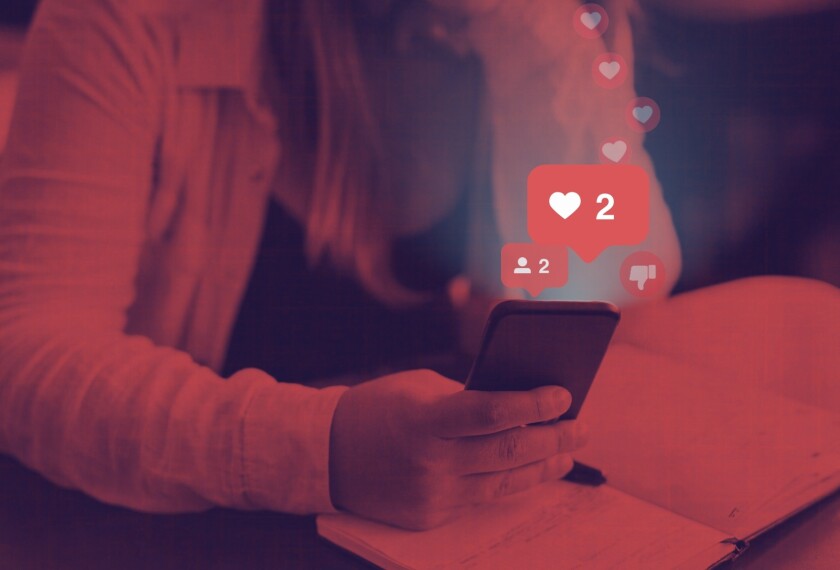Teenagers (well, most of us, really) are on our phones and social media a lot. In a , teens spent roughly 4.5 hours a day on their smartphones and received more than 200 notifications on a typical day.
But it’s not all for selfies, dance videos, and likes. Smartphones and social media are an integral part of everyday life. Businesses forgo websites in favor of Facebook pages. Plans are coordinated last minute via text. Even schools communicate important information on social media. Plus, more and more schoolwork is done on digital devices.
Taken together, these increasingly digitized functions can make it a struggle for teens to disconnect from their screens, says Palash Kapoor, 18, a youth advocate raising awareness about tech overuse and addiction. Kapor is from Cincinnati and recently graduated from Sycamore High School there.
While Kapoor pushes for teens to take breaks from their phones, he’s not convinced cellphone bans are the answer.
For a special series of conversations with three teens about what the adults in their schools most misunderstand about their cellphone and social media use, �����ܹ���̳ interviewed Kapoor. (The other two interviews in this series can be found here and here.)
This conversation has been edited for length and clarity.

What do the adults in your school get wrong about students’ cellphone and social media use?
Something that sometimes adults in school don’t know about is a lot of times students need their phones to contact their parents and sometimes their friends. After-school activities are a big portion of a student’s life and oftentimes these activities are being canceled like 30 minutes, 45 minutes before the end of the school day. And students have to plan their rides after school for students who don’t drive, accordingly.
I think the best moments you have in life [...] are when you give a high five to somebody during a tennis match, you give a fist bump to someone in the hallway, the nodding of heads you get when you’re telling someone your story.
There’s also that sense of safety people get with their cellphone. This is just a hypothetical situation, but if you’re lost somewhere, if you have your phone, you can call someone, you have your GPS.
If something were to happen in your school, parents feel reassured that their student at least has their phone with them so they can continue to update their parents about their safety.
Someone may have health issues or may be feeling sick or something along those lines. It’s always nice for the student to be able to contact their parents or relatives, their guardians, about how they’re feeling.
How much of your schoolwork do you do on a screen? And does that make it more difficult for you to manage your screen time?
Computers have become integrated into the learning environment. And I do feel like a lot of my assignments are on the computer. Even a lot of the time in the classroom where we’re looking at a computer screen, the teacher’s writing on one of those electronic whiteboards.
Actually, now, when I think about it, almost like 90 percent of the time we’re spending in the classroom is already on a screen. Whether it’s watching the teacher write something on a digital screen, watching a video on the screen, or even doing homework on the screen.
I think social media is a great compliment to your face-to-face interactions. It’s a great way to stay connected and maintain your relationships.
It does get really difficult to balance your social life on your phone and your computer. And then you want to watch TV, so it’s like every part of our life has some sort of technology element to it. I think that’s where an individual just has to be proactive and understand their limits and their balance.
After school, that’s when you need to start thinking about how you spend your time on your screen. As somebody who plays tennis, I see that as such a great opportunity to be away from my phone, be away from my screen, for a dedicated two hours on a [frequent] basis.
How have you seen tech overuse affect you or your peers’ social skills?
Overuse of social media can be an impediment to the growth of your social skills. Texting online or texting over social media with someone is completely different from having an in-person conversation with someone, because you’re missing the nonverbal aspects. That human connection only comes in a face-to-face environment. I think the best moments you have in life, or like the most meaningful moments, are when you give a high five to somebody during a tennis match, you give a fist bump to someone in the hallway, the nodding of heads you get when you’re telling someone your story.
But then I think social media is a great compliment to your face-to-face interactions. It’s a great way to stay connected and maintain your relationships.
Your phone’s a great way to also take pictures and maintain memories. I think that is also something that’s really important: taking photos and taking those moments and making sure you can remember them in the future. But I do think the social skills come from your in-person interactions.









